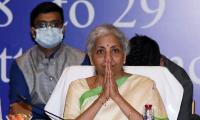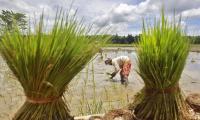Fisher Groups Oppose WTO Fisheries Subsidy Talks
Small-scale fisher groups from India, Indonesia, and Bangladesh demand WTO keep fisheries subsidy negotiations out of their purview, citing unfair and unbalanced talks.
New Delhi, Jul 17 (PTI) Ahead of the General Council meeting in Geneva, small-scale fisher groups from many countries, including India, Indonesia, and Bangladesh, have demanded that the WTO should not negotiate fisheries subsidies as the ongoing talks are 'unfair and unbalanced'.
Members of the Geneva-based 166-member World Trade Organisation (WTO) after finalising a deal on curbing harmful subsidies on illegal, unreported and unregulated fishing, are now discussing ways to curb these support measures that are contributing to overcapacity and overfishing (OCOF).
The General Council is the second highest decision-making body of the WTO after the ministerial conference (MC), which meets after every two years.
The World Forum of Fisher Peoples and the World Forum of Fish Harvesters and Fish Workers have raised concerns over the current text and said that exemptions for small-scale fishers across developing countries are being restricted by imposing irrational conditionalities.
"We, therefore, demand that fisheries subsidies negotiations should be kept out of the WTO, and any negotiations should be brought to the Committee of Fisheries (COFI) under the mandate of the Food and Agriculture Organization's Sub-Committee on Trade," the two organisation said in a statement after the recent SSF Summit and Committee on Fisheries meeting in Rome.
The statement added that like many small-scale food producers organisations around the world, "we express our concern" that fisheries is not an issue that belongs in the WTO.
"The current negotiations on the current agreement are confirming these concerns. It remains unfair and unbalanced and is at the risk of delivering exactly the opposite of its stated objectives," it noted.
The statement said their biggest concern lies with the "very" limited special and differential treatment provision that proposes an exemption for small-scale fishing across developing countries (in the draft text).
Special and differential treatment (S&DT) allows developing and poor countries benefits like longer time to implement agreements and binding commitments.
"We are aware that the comprehensive agreement, once concluded, will have serious implications for the future of small-scale fishers and indigenous peoples across the world," the organisations said in a statement.
They sought the negotiations to be moved to the Food and Agriculture Organization from the WTO.
India has also submitted three proposals on fisheries to the General Council, an official said.
Members of the Geneva-based 166-member World Trade Organisation (WTO) after finalising a deal on curbing harmful subsidies on illegal, unreported and unregulated fishing, are now discussing ways to curb these support measures that are contributing to overcapacity and overfishing (OCOF).
The General Council is the second highest decision-making body of the WTO after the ministerial conference (MC), which meets after every two years.
The World Forum of Fisher Peoples and the World Forum of Fish Harvesters and Fish Workers have raised concerns over the current text and said that exemptions for small-scale fishers across developing countries are being restricted by imposing irrational conditionalities.
"We, therefore, demand that fisheries subsidies negotiations should be kept out of the WTO, and any negotiations should be brought to the Committee of Fisheries (COFI) under the mandate of the Food and Agriculture Organization's Sub-Committee on Trade," the two organisation said in a statement after the recent SSF Summit and Committee on Fisheries meeting in Rome.
The statement added that like many small-scale food producers organisations around the world, "we express our concern" that fisheries is not an issue that belongs in the WTO.
"The current negotiations on the current agreement are confirming these concerns. It remains unfair and unbalanced and is at the risk of delivering exactly the opposite of its stated objectives," it noted.
The statement said their biggest concern lies with the "very" limited special and differential treatment provision that proposes an exemption for small-scale fishing across developing countries (in the draft text).
Special and differential treatment (S&DT) allows developing and poor countries benefits like longer time to implement agreements and binding commitments.
"We are aware that the comprehensive agreement, once concluded, will have serious implications for the future of small-scale fishers and indigenous peoples across the world," the organisations said in a statement.
They sought the negotiations to be moved to the Food and Agriculture Organization from the WTO.
India has also submitted three proposals on fisheries to the General Council, an official said.
You May Like To Read
TODAY'S MOST TRADED COMPANIES
- Company Name
- Price
- Volume
- Vodafone-Idea-L
- 11.65 (+ 3.56)
- 106772451
- Alstone-Textiles
- 0.28 ( -3.45)
- 44187760
- Mangalam-Industrial
- 0.88 ( -2.22)
- 39177573
- Sunshine-Capital
- 0.27 (+ 3.85)
- 35956340
- GMR-Airports
- 104.40 (+ 6.37)
- 30453005





